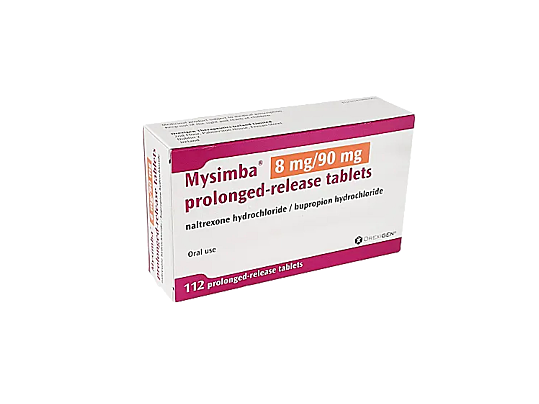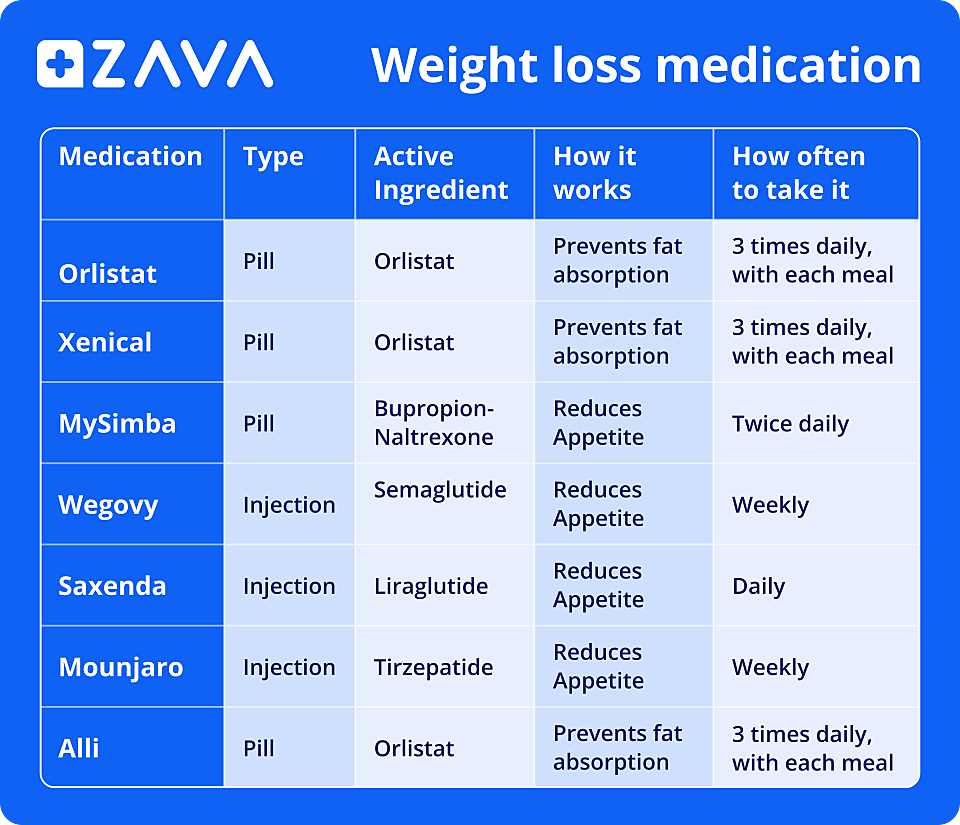Weight Loss Treatment
Find the right weight loss treatment for you.
Prices from £19.00
Fill in a brief consultation questionnaire and one of our doctors will review your request today.
Start or continue your weight loss journey with ZAVA.
Lose up to 20% of your body weight* with evidence-based treatments, such as Wegovy, Mounjaro, Mysimba, Orlistat and alli.
Supporting you every step of the way
✓ FREE check-ins & ongoing care: Our team of NHS-trained GPs are there for you at every stage of your journey – free of charge.
✓ FREE weight loss support pack: Developed by our in-house nutritionist and our doctors, your free weight loss support pack gives you the best chance of success.
✓ Weight loss at an affordable price: It’s important for us to make weight loss treatments accessible to everyone. That’s why we offer our treatments at more affordable prices than other weight loss programmes provided by big-name, high-street brands.
*effectiveness depends on the type of weight loss treatment
Are you already using ZAVA’s weight loss service?
We have a list of frequently asked questions about our service for you to read if you need any extra information:
Weight loss treatments

In stock. Prices from £19.00

No results found.
Please check your spelling or try another treatment name.




Weight Loss Treatment
-
-
The main treatment for obesity is exercise and a healthy, balanced diet. In addition to that you can also use weight loss medication to help you lose weight. You may be eligible for weight loss surgery, but only if you have tried all other methods and they have not worked.
Obesity is a term used when someone has a lot of body fat. The easiest way to check your weight is by using a BMI calculator. You are classed as obese if you have a BMI of 30 or above, or overweight if you have a BMI between 25 and 29.9.
-
-

Each prescription weight loss medication works in a slightly different way, as they contain different active ingredients. Wegovy, Mounjaro, Saxenda and Mysimba all work on the brain and other organs, to reduce appetite levels and cravings, making it easier to eat less and lose weight.
Orlistat, alli, and Xenical work by changing how your body digests fat. alli is actually an over-the-counter weight loss pill, but a doctor or pharmacist still needs to check your BMI and medical history to make sure it’s suitable.
We have a range of weight loss treatments available that can help you lose weight, including tablets and injections. These need to be prescribed for you and can be used if you are obese, or if you are overweight and have other medical problems that are affected by weight, such as diabetes or high blood pressure.
-
-
Wegovy is a weight loss injection that contains the active ingredient semaglutide. This acts like another hormone in your body called glucagon-like peptide-1 (GLP-1). Usually, after you have eaten a meal, your intestines release GLP-1 to tell your brain that you have eaten. Wegovy works the same way and sends signals to your brain that you are full, so you can eat less and reduce your weight.
Mounjaro is also an injectable weight loss treatment. The active ingredient tirzepatide mimics not just 1 but 2 hormones which are involved in hunger and satiety signaling. Similar to Wegovy, it helps you lose weight by reducing hunger and prolonging satiety. It should always be used alongside lifestyle choices, such as a healthy diet and exercise regimen.
Saxenda is another injection that is available for people to help them lose weight. It contains a different ingredient mimicking the hormone GLP-1, liraglutide. Like Wegovy and Mounjaro, Saxenda tells your brain you’re full, making it easier to eat less and lose weight with diet and exercise. It is injected once a day.
Weight loss tablets
Orlistat and Xenical contain the active ingredient orlistat. When taken with a meal that contains fat, it attaches to the enzymes in your digestive system, called lipases. Orlistat blocks lipase from breaking down fat in your food and absorbing it. This means some of the fat from your meal will turn into waste and be eliminated from your body. alli is an over-the-counter weight loss tablet that also contains orlistat, but at a lower dose of 60 mg.
Mysimba works differently than orlistat. Instead of having an effect on the digestive system, it works on the areas of your brain that control energy levels and food intake. This can reduce your appetite so that you feel fuller when you eat less. The combination of the 2 active ingredients in Mysimba can also control the pleasure you get from eating, reducing food cravings.
When you take any weight loss treatment, our doctors will review your weight regularly and make sure it is working as it should. Any weight loss medication must be taken alongside a healthy diet plan and regular exercise.
-
-
Weight loss treatment can have side effects, just like any other medication. Not everyone will get them and if they do appear, they usually only last for a few weeks. If you get side effects whilst taking weight loss treatment and they do not go away or bother you a lot, you can speak to our doctors. Some treatments are increased gradually over time, like Wegovy and Mysimba, to reduce the chances of side effects.
Common Wegovy side effects
The most common side effects of Wegovy are:
- headaches
- feeling sick / being sick
- diarrhoea
- constipation
- stomach pain
- feeling weak or tired
The side effects usually go away over time.
Common Mounjaro side effects
Very common side effects of Mounjaro are:
- diarrhoea
- constipation
- feeling sick (nausea) and vomiting
- when used in combination with certain diabetes medications: low blood sugar
Side effects that affect the digestive system are usually not severe. They mostly show up after starting the treatment or after increasing the dosage – once the body gets used to the medication these side effects usually disappear.
Common Mysimba side effects
Common Mysimba side effects include:
- hot flushes
- anxiety
- trouble sleeping
- headaches
- dizziness
- restlessness
- heart palpitations
These usually go away once your body gets used to the medication. You cannot take Mysimba if you have certain medical conditions, but our doctors will check your suitability before prescribing.
Common orlistat, alli, and Xenical side effects
The most common side effects of orlistat, alli, and Xenical are:
- needing to poo urgently and more frequently
- oily or fatty poo
- oily discharge from your rectum (anus)
- flatulence (farting)
Sticking to a low fat diet will decrease the risk of these side effects.
-
-
You can get some weight loss medications over the counter, but they don’t usually contain an active ingredient. An exception to this is alli, which contains orlistat but at a lower dose of 60 mg per tablet. That being said, you can only take weight loss medication if you meet certain conditions and some treatments cannot be taken if you take other medications or have certain health conditions.
So, even if you want to take alli, a pharmacist or doctor will need to check your medical history and BMI first. Our doctors will make sure it is safe to take any weight loss medication before you are prescribed it.
-
-
Although a healthy and balanced diet can help you to lose weight, you also need to burn energy through regular exercise. The UK government recommends that adults do at least 150 minutes of moderate intensity exercise every week. This can be split into 30 minute sessions 5 times a week. Some exercise is better than none, so if you struggle to exercise, you can increase this slowly, starting with 10 minutes a day.
Exercise has many health benefits and can reduce the risk of other illnesses that can affect your weight. According to the NHS, regular exercise can reduce the risk of getting type 2 diabetes by 40%.
Moderate intensity exercise is anything that increases your breathing and heart rate, so this can be different for everyone. Some common examples are:
- cycling
- power walking
- dancing
- swimming
You can also do 75 minutes of vigorous exercise every week if you have less time, or a combination of both. Vigorous exercise is anything that causes your heart to beat rapidly and you to breathe very hard, so that you could not hold a conversation. This includes:
- competitive sports like rugby, gymnastics, and boxing
- circuit training
- running
To help your weight loss journey you should also do strength and balance exercises twice a week. You can build strength by carrying shopping bags or doing a strength based exercise like yoga or tai chi. Your local gym will have everything you need to work on your strength and balance.
As we spend a lot of our time sitting down, it is also vital that you break up sedentary (sitting) time by standing up and moving around. If you need help with an exercise plan, your GP, a weight loss advisor, or a personal trainer at your local gym can help create a plan for you. It is better to make small achievable goals that you can stick to. If you have never exercised before, you do not need to jump in with 75 minutes a week straight away.
If you are or have been obese, you may need to exercise more. To prevent obesity, you should do moderate intensity exercise for 45 to 60 minutes a day. For those who have been obese, it is recommended to do 60 to 90 minutes of exercise a day, or you may regain any weight that you have lost.
To make exercise a part of your daily life, find something that you enjoy doing or add social elements by working out with your partner, family, or friends.
-
-
To lose weight at a safe pace of 0.5 to 1 kg a week, you should reduce your calorie intake by 600 kcals a day. Your doctor will help you with a diet plan if you need it. This is not about following a ‘fad’ diet, but about making healthier long lasting choices that will improve your eating habits for the rest of your life.
For women, weight loss can be achieved by consuming no more than 1,400 calories a day. Men should be eating no more than 1,900 calories daily. To lose weight, you should swap high energy and unhealthy foods for healthier choices. This means lowering your intake of processed food, fast food, and sugary drinks like sodas and alcohol.
A healthy and balanced diet should include:
- some dairy foods and milk
- some sources of protein such as meat, eggs, fish, and beans
- lots of vegetables and fruits
- some rice, pasta, bread, potatoes, and other starchy foods (ideally these will be wholegrain)
- only small amounts of foods or drinks that contain a lot of sugar or fat
If you are overweight or obese, try to avoid any foods that contain a lot of salt. This can increase your blood pressure, which could cause hypertension.
Read food and drink labels so you can work out how many calories you are having in a day. Drinking lots of water is the best way to cut out unnecessary calories in drinks.
You should avoid any ‘fad’ diets, as these are not healthy or realistic and tend not to work. They can make you feel ill and cutting out an entire food group or not eating for a long period of time (fasting) is not sustainable. If you want to follow a diet programme, make sure it:
- is not overly restrictive on what foods you can have
- educates you about healthy eating and portion sizes
- is based on losing weight safely and gradually, to achieve long term weight loss goals that are likely to last
If you are considering a very low calorie diet, which means consuming less than 800 calories each day, you should speak to your doctor. Only some people are suitable for this and if you are, you should not do it for longer than 12 weeks.
-
-
Weight loss surgery can sometimes be used as a treatment for obesity. It is only available through the NHS if you are severely obese and:
- are fit enough to have surgery
- have a BMI over 40, or between 35 and 40 and certain health conditions that weight loss could improve, such as type 2 diabetes
- are committed to the long term follow up of your surgery
- you have tried all other weight loss strategies but they have not achieved or maintained weight loss
- you are receiving intensive management of your weight, usually through your GP
In rare cases, surgery may be recommended straight away if you have a BMI over 50.

Dr Babak Ashrafi Clinical Lead for Service Expansion
Accreditations: BSc, MBBS, MRCGP (2008)
Babak studied medicine at King’s College London and graduated in 2003, having also gained a bachelor’s degree in Physiology during his time there. He completed his general practice (GP) training in East London, where he worked for a number of years as a partner at a large inner-city GP practice. He completed the Royal College of GPs membership exam in 2007.
Meet our doctorsLast reviewed: 29 Feb 2024
-
Mysimba 8mg/90mg prolonged-release tablets (2021) EMC (accessed 14 April 2022)
-
Obesity (2019) NHS (accessed 14 April 2022)
-
Saxenda 6mg/mL solution for injection in pre-filled pen (2021) EMC (accessed 14 April 2022)
-
Xenical 120mg hard capsules (2017) EMC (accessed 14 April 2022)
-
Wegovy FlexTouch 0.25 mg, 0.5 mg, 1 mg, 1.7 mg and 2.4 mg (2023) EMC (accessed 31 January 2024)













